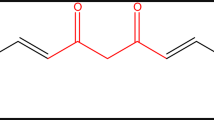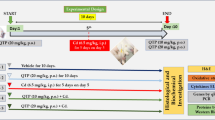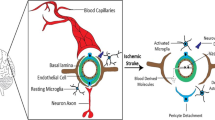Abstract
Anesthetics have been reported to promote Alzheimer’s disease neuropathogenesis by inducing amyloid beta (Aβ) protein accumulation and apoptosis. The aim of this study was to evaluate the effect of propofol on the apoptosis, Aβ accumulation, and inflammation induced by sevoflurane in human neuroglioma cells. Human neuroglioma cells were treated with or without sevoflurane and then co-incubated with or without propofol. Cell apoptosis was evaluated by fluorescence-activated cell sorting analysis (FACS) using AV-PI kits, and data showed that apoptosis induced by sevoflurane was significantly attenuated by propofol treatment. In addition, with the reactive oxygen species (ROS) production measured by FACS after staining with dichloro-dihydrofluorescein diacetate, propofol could significantly reduce the production of ROS as well as the accumulation of Aβ induced by sevoflurane assessed by enzyme-linked immuno sorbent assay (ELISA) analysis. On the other hand, the same treatment decreased the inflammation factor production of interleukin-6. Moreover, the level of nuclear factor-kappa B (NF-κB) was tested by Western blot and immunofluorescence assay. We found that the activation of NF-κB pathway was suppressed by propofol. The results suggest that propofol can effectively attenuate the apoptosis, Aβ accumulation, and inflammation induced by sevoflurane in human neuroglioma cells through NF-κB signal pathway.



Similar content being viewed by others
References
Adams JM, Cory S (2007) The Bcl-2 apoptotic switch in cancer development and therapy. Oncogene 26:1324–1337
Akiyama H, Barger S, Barnum S, Bradt B, Bauer J, Cole GM, Cooper NR, Eikelenboom P, Emmerling M, Fiebich BL, Finch CE, Frautschy S, Griffin WS, Hampel H, Hull M, Landreth G, Lue L, Mrak R, Mackenzie IR, McGeer PL, O’Banion MK, Pachter J, Pasinetti G, Plata-Salaman C, Rogers J, Rydel R, Shen Y, Streit W, Strohmeyer R, Tooyoma I, Van Muiswinkel FL, Veerhuis R, Walker D, Webster S, Wegrzyniak B, Wenk G, Wyss-Coray T (2000) Inflammation and Alzheimer’s disease. Neurobiol Aging 21:383–421
Baranov D, Bickler PE, Crosby GJ, Culley DJ, Eckenhoff MF, Eckenhoff RG, Hogan KJ, Jevtovic-Todorovic V, Palotas A, Perouansky M, Planel E, Silverstein JH, Wei H, Whittington RA, Xie Z, Zuo Z (2009) Consensus statement: first International workshop on anesthetics and Alzheimer’s disease. Anesth Analg 108:1627–1630
Bittner EA, Yue Y, Xie Z (2011) Brief review: anesthetic neurotoxicity in the elderly, cognitive dysfunction and Alzheimer’s disease. Can J Anaesth 58:216–223
Braida D, Sacerdote P, Panerai AE, Bianchi M, Aloisi AM, Iosue S, Sala M (2004) Cognitive function in young and adult IL (interleukin)-6 deficient mice. Behav Brain Res 153:423–429
Brosnan H, Bickler PE (2013) Xenon neurotoxicity in rat hippocampal slice cultures is similar to isoflurane and sevoflurane. Anesthesiology 119:335–344
Chiu WT, Lin YL, Chou CW, Chen RM (2009) Propofol inhibits lipoteichoic acid-induced iNOS gene expression in macrophages possibly through downregulation of toll-like receptor 2-mediated activation of Raf-MEK1/2-ERK1/2-IKK-NFkappaB. Chem Biol Interact 181:430–439
Creeley C, Dikranian K, Dissen G, Martin L, Olney J, Brambrink A (2013) Propofol-induced apoptosis of neurones and oligodendrocytes in fetal and neonatal rhesus macaque brain. Br J Anaesth 110(Suppl 1):i29–i38
Cui WY, Liu Y, Zhu YQ, Song T, Wang QS (2014) Propofol induces endoplasmic reticulum (ER) stress and apoptosis in lung cancer cell H460. Tumour Biol 35:5213–5217
Dong Y, Zhang G, Zhang B, Moir RD, Xia W, Marcantonio ER, Culley DJ, Crosby G, Tanzi RE, Xie Z (2009) The common inhalational anesthetic sevoflurane induces apoptosis and increases beta-amyloid protein levels. Arch Neurol 66:620–631
Eckenhoff RG, Johansson JS, Wei H, Carnini A, Kang B, Wei W, Pidikiti R, Keller JM, Eckenhoff MF (2004) Inhaled anesthetic enhancement of amyloid-beta oligomerization and cytotoxicity. Anesthesiology 101:703–709
Goate A, Chartier-Harlin MC, Mullan M, Brown J, Crawford F, Fidani L, Giuffra L, Haynes A, Irving N, James L et al (1991) Segregation of a missense mutation in the amyloid precursor protein gene with familial Alzheimer’s disease. Nature 349:704–706
Goossens P, Vergouwe MN, Gijbels MJ, Curfs DM, van Woezik JH, Hoeksema MA, Xanthoulea S, Leenen PJ, Rupec RA, Hofker MH, de Winther MP (2011) Myeloid IkappaBalpha deficiency promotes atherogenesis by enhancing leukocyte recruitment to the plaques. PLoS One 6:e22327
Holtzman DM, Deshmukh M (1997) Caspases: a treatment target for neurodegenerative disease? Nat Med 3:954–955
Hsing CH, Lin MC, Choi PC, Huang WC, Kai JI, Tsai CC, Cheng YL, Hsieh CY, Wang CY, Chang YP, Chen YH, Chen CL, Lin CF (2011) Anesthetic propofol reduces endotoxic inflammation by inhibiting reactive oxygen species-regulated Akt/IKKbeta/NF-kappaB signaling. PLoS One 6:e17598
Karin M, Ben-Neriah Y (2000) Phosphorylation meets ubiquitination: the control of NF-[kappa]B activity. Annu Rev Immunol 18:621–663
Kim TW, Pettingell WH, Jung YK, Kovacs DM, Tanzi RE (1997) Alternative cleavage of Alzheimer-associated presenilins during apoptosis by a caspase-3 family protease. Science 277:373–376
Ley R, Ewings KE, Hadfield K, Cook SJ (2005) Regulatory phosphorylation of Bim: sorting out the ERK from the JNK. Cell Death Differ 12:1008–1014
Li D, Wang C, Li N, Zhang L (2014) Propofol selectively inhibits nuclear factor-kappaB activity by suppressing p38 mitogen-activated protein kinase signaling in human EA.hy926 endothelial cells during intermittent hypoxia/reoxygenation. Mol Med Rep 9:1460–1466
Masters CL, Simms G, Weinman NA, Multhaup G, McDonald BL, Beyreuther K (1985) Amyloid plaque core protein in Alzheimer disease and down syndrome. Proc Natl Acad Sci USA 82:4245–4249
Pearn ML, Hu Y, Niesman IR, Patel HH, Drummond JC, Roth DM, Akassoglou K, Patel PM, Head BP (2012) Propofol neurotoxicity is mediated by p75 neurotrophin receptor activation. Anesthesiology 116:352–361
Querfurth HW, LaFerla FM (2010) Alzheimer’s disease. N Engl J Med 362:329–344
Rossaint J, Rossaint R, Weis J, Fries M, Rex S, Coburn M (2009) Propofol: neuroprotection in an in vitro model of traumatic brain injury. Crit Care 13:R61
Selkoe DJ (2001) Alzheimer’s disease: genes, proteins, and therapy. Physiol Rev 81:741–766
Selkoe DJ, Podlisny MB, Joachim CL, Vickers EA, Lee G, Fritz LC, Oltersdorf T (1988) Beta-amyloid precursor protein of Alzheimer disease occurs as 110- to 135-kilodalton membrane-associated proteins in neural and nonneural tissues. Proc Natl Acad Sci USA 85:7341–7345
Shao H, Zhang Y, Dong Y, Yu B, Xia W, Xie Z (2014) Chronic treatment with anesthetic propofol improves cognitive function and attenuates caspase activation in both aged and Alzheimer’s disease transgenic mice. J Alzheimers Dis 41:499–513
Shi SS, Yang WZ, Chen Y, Chen JP, Tu XK (2014) Propofol reduces inflammatory reaction and ischemic brain damage in cerebral ischemia in rats. Neurochem Res 39:793–799
Song XM, Wang YL, Li JG, Wang CY, Zhou Q, Zhang ZZ, Liang H (2009) Effects of propofol on pro-inflammatory cytokines and nuclear factor kappaB during polymicrobial sepsis in rats. Mol Biol Rep 36:2345–2351
Tagawa T, Sakuraba S, Kimura K, Mizoguchi A (2014) Sevoflurane in combination with propofol, not thiopental, induces a more robust neuroapoptosis than sevoflurane alone in the neonatal mouse brain. J Anesth 28:815–820
Tanzi RE, Bertram L (2005) Twenty years of the Alzheimer’s disease amyloid hypothesis: a genetic perspective. Cell 120:545–555
Wan Y, Xu J, Ma D, Zeng Y, Cibelli M, Maze M (2007) Postoperative impairment of cognitive function in rats: a possible role for cytokine-mediated inflammation in the hippocampus. Anesthesiology 106:436–443
Willis SN, Adams JM (2005) Life in the balance: how BH3-only proteins induce apoptosis. Curr Opin Cell Biol 17:617–625
Wu GJ, Chen TL, Chang CC, Chen RM (2009) Propofol suppresses tumor necrosis factor-alpha biosynthesis in lipopolysaccharide-stimulated macrophages possibly through downregulation of nuclear factor-kappa B-mediated toll-like receptor 4 gene expression. Chem Biol Interact 180:465–471
Wu GJ, Chen WF, Hung HC, Jean YH, Sung CS, Chakraborty C, Lee HP, Chen NF, Wen ZH (2011) Effects of propofol on proliferation and anti-apoptosis of neuroblastoma SH-SY5Y cell line: new insights into neuroprotection. Brain Res 1384:42–50
Wu X, Lu Y, Dong Y, Zhang G, Zhang Y, Xu Z, Culley DJ, Crosby G, Marcantonio ER, Tanzi RE, Xie Z (2012) The inhalation anesthetic isoflurane increases levels of proinflammatory TNF-alpha, IL-6, and IL-1beta. Neurobiol Aging 33:1364–1378
Xie Z, Xu Z (2013) General anesthetics and beta-amyloid protein. Prog Neuropsychopharmacol Biol Psychiatry 47:140–146
Xiong WX, Zhou GX, Wang B, Xue ZG, Wang L, Sun HC, Ge SJ (2013) Impaired spatial learning and memory after sevoflurane-nitrous oxide anesthesia in aged rats is associated with down-regulated cAMP/CREB signaling. PLoS One 8:e79408
Yin S, Wang R, Zhou F, Zhang H, Jing Y (2011) Bcl-xL is a dominant antiapoptotic protein that inhibits homoharringtonine-induced apoptosis in leukemia cells. Mol Pharmacol 79:1072–1083
Zhang Y, Zhen Y, Dong Y, Xu Z, Yue Y, Golde TE, Tanzi RE, Moir RD, Xie Z (2011) Anesthetic propofol attenuates the isoflurane-induced caspase-3 activation and Abeta oligomerization. PLoS One 6:e27019
Zhang L, Zhang J, Yang L, Dong Y, Zhang Y, Xie Z (2013) Isoflurane and sevoflurane increase interleukin-6 levels through the nuclear factor-kappa B pathway in neuroglioma cells. Br J Anaesth 110(Suppl 1):i82–i91
Zhao W, Zhou S, Yao W, Gan X, Su G, Yuan D, Hei Z (2014) Propofol prevents lung injury after intestinal ischemia-reperfusion by inhibiting the interaction between mast cell activation and oxidative stress. Life Sci 108:80–87
Acknowledgments
This study was supported by a grant from Shengjing Hospital of China Medical University (No. 2014sj08).
Conflict of interest
The authors do not have any possible conflicts of interest.
Author information
Authors and Affiliations
Corresponding author
Rights and permissions
About this article
Cite this article
Tian, Y., Guo, S., Guo, Y. et al. Anesthetic Propofol Attenuates Apoptosis, Aβ Accumulation, and Inflammation Induced by Sevoflurane Through NF-κB Pathway in Human Neuroglioma Cells. Cell Mol Neurobiol 35, 891–898 (2015). https://doi.org/10.1007/s10571-015-0184-8
Received:
Accepted:
Published:
Issue Date:
DOI: https://doi.org/10.1007/s10571-015-0184-8




